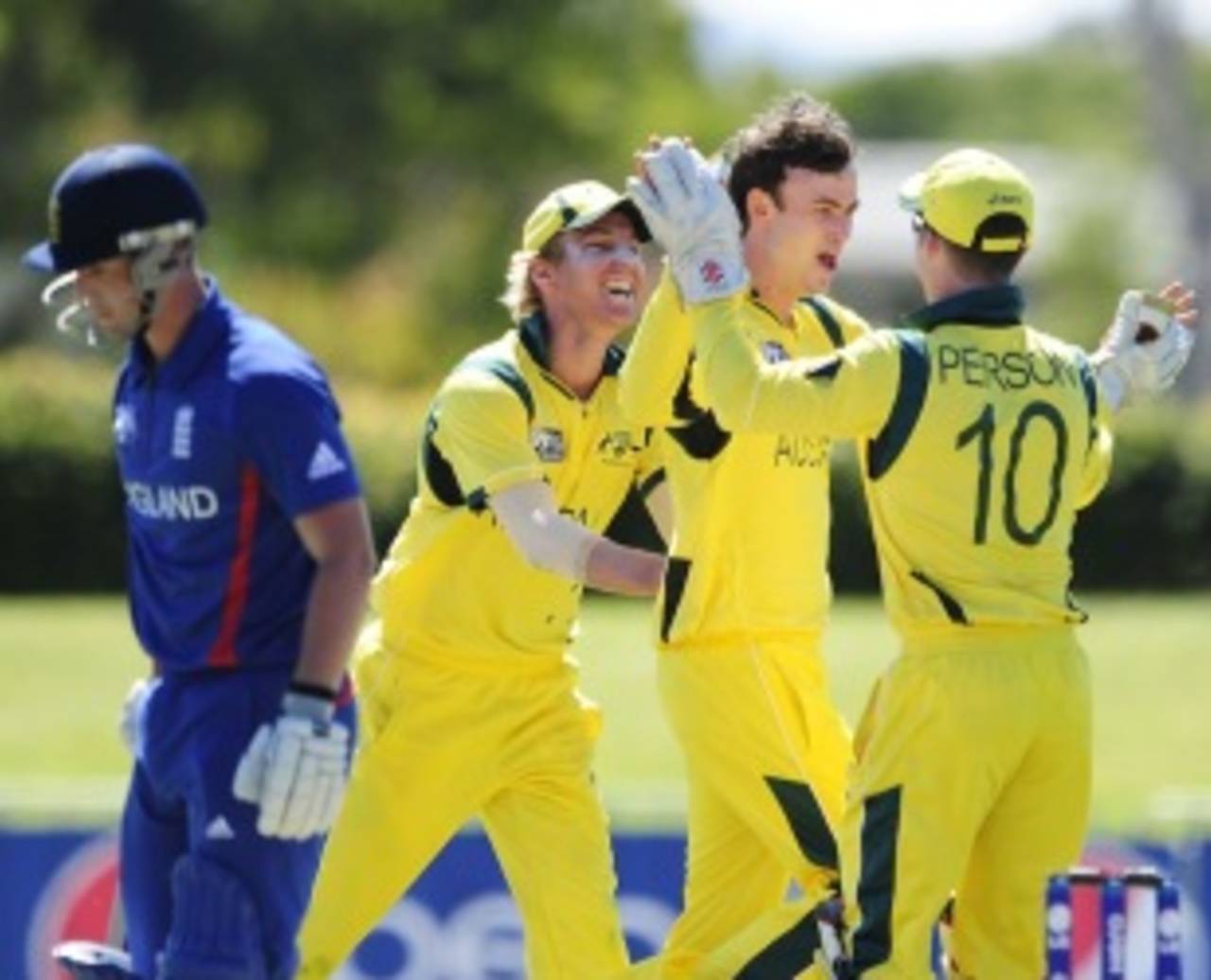Australia captain
William Bosisto and offspinner
Ashton Turner, two of four players from Western Australia in the Under-19 World Cup squad, have not made headlines yet. Those have gone to the fast-bowling group and the more aggressive batsmen but the duo's contributions have been critical to Australia winning three out of three games in Group A.
Bosisto's only made 78 runs in three innings, but is yet to be dismissed in the tournament. His unbeaten 35
against England steered Australia through a testing period of the chase and helped secure victory. His contributions, and his ability to not give away his wicket, have not escaped the coach Stuart Law's attention. He said there was "no nonsense" about Bosisto.
"I'm really pleased with the captain, the way he's handled himself on the field, and with the bat he's yet to be dismissed," Law said. "He just goes about doing the same thing all the time, and to be a consistent international cricketer you've got to stay pretty much the same all the way through, no matter what the situation. He's done that brilliantly."
In Australia's third game, Bosisto faced 84 balls for his unbeaten 36
against Ireland, showing patience even though the target was only 130. "I think that's my role in this side, we've got a lot of aggressive players who like to get moving and get the scoreboard ticking over," Bosisto said. "So I think my role is to rotate the strike and get those blokes on strike so they can score quickly. And then when it comes to the end of the innings, I can score quickly too."
Law was also impressed by Bosisto's captaincy during the group stage. "When he's had the opportunity to really attack, he's done it," Law said. "He's probably been too aggressive and that's not a bad thing, that's a great thing. If you can teach captains to be aggressive and set fields to take wickets rather than set fields to stop a bad ball getting hit for four, it's amazing how many good balls are bowled."
Shane Warne always emphasised the importance of a good rapport between a captain and a spinner and Bosisto has that with Turner, who became Australia's first-choice spinner after Ashton Agar broke a finger. While a four-pronged pace attack has been the spearhead of the bowling unit so far, Turner's managed to take the most wickets, seven in three games.
Bosisto and Turner go way back, having played against each other at school and then with each other in age-group cricket for Western Australia. Turner reckons he's played more than 100 games of cricket with Bosisto.
"We get on really well, he knows my game really well, he knows how I bowl in certain situations," Turner said. "He's very good at reading the game and knowing when he wants the spinner to come on. When I feel like it is time for me to bowl, I generally look over and he's already thinking about it and he gives me the nod and I'm ready to go."
The feeling is mutual. "It's quite easy captaining blokes who know the fields they want," Bosisto said of Turner. "He's a smart cricketer himself so he knows how he's trying to get the batsman out and restrict scoring. I think we work quite well together. We kind of know how the other thinks."
Coming into this World Cup from Western Australia, Turner's had to get used to a couple of things he wasn't quite familiar with. "I haven't played too much cricket in Brisbane or Townsville so it's sort of new for me as well. [The pitches are] quite hard, they are not really suitable to spin bowling, but I've been able to get a bit out of it, so it's pleasing."
The three-match series against Pakistan on the Gold Coast before the World Cup warm-ups was also the first time Turner played a 50-over game with a new ball at either end. He's enjoyed bowling with a ball that is about ten overs old. "I find it really easy to grip and obviously it drifts quite a lot, especially because it's so hard," Turner said. "I think it offers a little more variation, because if it hits the shiny side, which is harder, it does skid on a bit. The seam is hard still so some spin and some slide on."
Turner's chosen a craft in cricket that is quite easy to be average at but difficult to master, and few finger-spinners in Australia have had long international careers. He knows the importance of developing into an attacking bowler rather than a largely defensive one. "I like to read the play and know that when the situation suits I can be attacking," Turner said. "It's not always about being attacking every ball, but when I feel like I have built pressure, and pressure is coming from the other end, I can slow the ball down and I can try and drift it a bit. I can really put some revs on it and try and spin it as much as I can."
As the pitches wear during the latter stages of the World Cup, Turner's role in the Australian attack could be more prominent. And when this tournament is done, he and Bosisto will return to Western Australia, where they both have rookie contracts for the coming year.
George Binoy is an assistant editor at ESPNcricinfo
